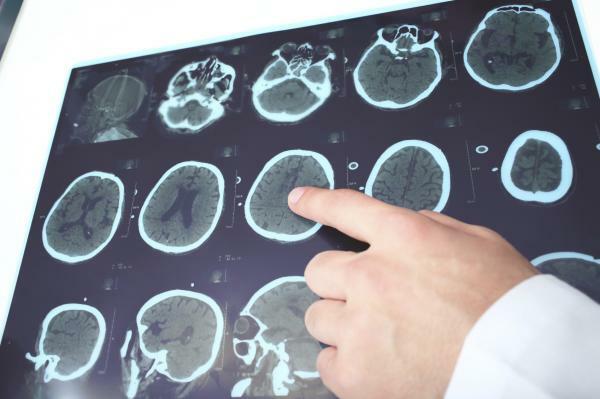
The term dementia describes a set of symptoms including memory loss and difficulties in planning, solving problems, impaired language, memory, changes in mood, loss of interest in activities, isolation, etc. Some of these symptoms occur when there is brain damage caused by certain causes or disease. Alzheimer's dementia and vascular dementia are two types of dementia, they have many similar symptoms and characteristics, but there are some clear differences between the two types. In this Psychology-Online article, we explain the differences between Alzheimer's and vascular dementia.
Vascular dementia is caused by reduced blood supply to the brain due to blood vessel problems To be healthy and function properly, brain cells need a constant supply of blood to supply oxygen and nutrients. Blood is delivered to the brain through a network of vessels called the vascular system. If the vascular system within the brain is damaged, blocking the blood vessels, the blood cannot reach the brain cells and they will eventually die. The death of brain cells can cause
Some of the symptoms of vascular dementia they are similar to those of other dementias. The most common cognitive symptoms in the early stages of the disease are:
- Planning or organizing problems, decision making or problem solving.
- Difficulty following various steps, for example cooking.
- Slow thought speed.
- Concentration problems, including short periods of time.
A person in the early stages of vascular dementia may also have difficulties with:
- Memory problems regarding recent events.
- Language problems.
- Visuospatial problems.
In addition to these cognitive symptoms, it is common to experience mood swings, such as apathy, depression, or anxiety. Depression is common in part because people with vascular dementia may be aware of the difficulties they are experiencing. Although in more advanced stages, the person loses consciousness about what is happening.

Alzheimer's dementia is the most common type of dementia. In Alzheimer's disease, what we call senile plaques and neurofibrillary tangles, a cluster of proteins that block the connections between neurons causing their death. In addition, there are also low levels of some chemicals, which are important because they help the efficient transmission of certain signals. As there is not enough of these substances, this transmission is either ineffective or does not occur.
Current treatments can increase the levels of these chemicals in the brain, helping to slow down some of the symptoms. Alzheimer's is a progressive disease, which means that more parts of the brain will be damaged over time, causing more symptoms of greater severity.
The most characteristic symptom that appears in the early stages of the disease ismemory loss. The person can:
- Forget objects (keys, glasses ...).
- Forgetting a person's name or not finding the right word to speak.
- Forget recent conversations or events.
- Get lost in familiar places.
- Forget important dates.
In addition to these memory problems, there can also be:
- Language problems.
- Visuospatial skills problems.
- Concentration, planning or organization problems.
- Orientation.
Along with these cognitive symptoms, there can also be changes in mood, anxiety, irritability or depressive symptoms.
Next, we list the main differences between vascular dementia and Alzheimer's:
Prevalence
Alzheimer's dementia is the most common dementia, while vascular dementia is less prevalent.
Cause
Vascular dementia is usually caused by a specific event, such as a stroke or transient ischemic attack, where blood flow to the brain is interrupted. It can also develop gradually after several small strokes or blockages of blood flow.
However, we do not know the cause of Alzheimer's dementia, there is talk of a mixture of genetic, environmental and lifestyle factors. life, although we know that there are several ways to reduce the probability of developing it: exercising, exercising the mind, among other
Risk factor's
Some of the risk factors for vascular dementia are diabetes, high blood pressure, heart problems, cholesterol, and peripheral artery disease.
Risk factors for Alzheimer's type dementia are age, genetic and health in general.
Cognition
In vascular dementia, cognitive abilities appear to decline suddenly after a stroke or transient ischemic attack and remain stable for a time.
In Alzheimer's dementia, although there are variations, cognitive abilities gradually decline over time. There is no sudden significant change from one day to the next.
Walking and movement
Vascular dementia is often accompanied by physical changes, for example, after a stroke the person may have limited movement on one side of their body. The cognitive and physical alterations resulting from vascular dementia usually develop at the same time, since they are products of a specific event.
In Alzheimer's dementia, memory or judgment is affected first and then later in stages. advanced disease, physical abilities such as balance or walking begin to be affected slow.
Diagnosis
In vascular dementia, there are some tests that can help assess memory, judgment, communication, and general cognitive skills. In addition to these tests, an MRI can identify the specific area where the stroke has occurred.
In Alzheimer's dementia, there are similar cognitive tests used to assess brain function, but Alzheimer's is diagnosed after ruling out other causes. There are no specific tests for diagnosis, so it is diagnosed after eliminating other possible reversible causes that produce confusion such as vitamin B12 deficiency and normal pressure hydrocephalus, as well as other types of dementia or delusions.
Disease progression
In vascular dementia, as there are several causes that can produce it, it is difficult to predict the time of progression of the disease, since it depends on the case.
In Alzheimer's dementia, symptoms from the onset can last an average of 8.4 years.

This article is merely informative, in Psychology-Online we do not have the power to make a diagnosis or recommend a treatment. We invite you to go to a psychologist to treat your particular case.


